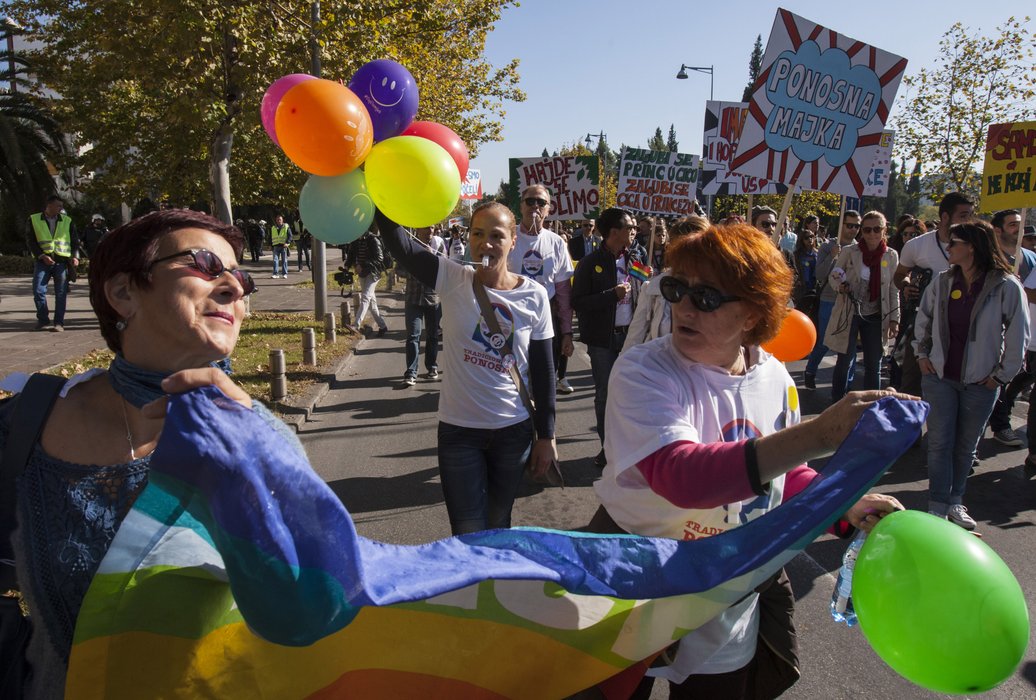
Association
According to the latest European Commission report on Montenegro, published on 12th October 2022 as part of the EC’s 2022 Enlargement Package, the role of civil society in Montenegro is “recognised and promoted, although the current legal and institutional framework needs to be further improved to strengthen the consultation and cooperation mechanisms between state institutions and civil society in the context of the EU accession process.” The report also notes that, although funding rules for CSOs are in place, only a few ministries launched calls to award grants to such organisations, which is against the Law on NGOs.
Peaceful Assembly
On 8th October 2022, several hundred people joined the 10th LGBTQ Pride march in Montenegro, dubbed "No more buts," demanding that more needs to be done to stem hate speech and harassment of the LGBTQI+ community, despite positive steps that have been made in the past few years. Participants of the Pride parade demanded that the Government continue the implementation of the strategy for a better life for LGBTQI+ people, which has almost stopped.
The protest was held amid strong opposition from the influential Serbian Orthodox Church. Namely, the day before, hundreds of people gathered for a protest prayer led by the Serbian Orthodox Church against the holding of the Pride march. The church called on its followers in Montenegro to join the prayer for “the sanctity of marriage and preservation of family” after organising a similar gathering in neighbouring Serbia ahead of a pan-European Pride event there last month.
On 10th October 2022, locals protested the placement of a memorial plaque at the former camp of the Yugoslav People's Army (JNA) in Morinje near Kotra where, during 1991 and 1992, Croatian soldiers and civilians captured on the battlefield near Dubrovnik were kept. Ahead of the unveiling ceremony, a group of 50 locals blocked the road to the former concentration camp, alleging that Montenegrin and Croatian officials were causing tensions. The media reported that the police covered the area around the former camp.
According to the EC Report, freedom of peaceful assembly continues to be broadly respected in Montenegro. The Law on Freedom of Assembly is still unevenly applied and there are incidents of arrests and fines, depending on the nature of the public gathering. The Law on Public Assemblies and Public Events does not more precisely regulate spontaneous assemblies. In 2021, 287 public assemblies took place. The police issued eight decisions to temporarily ban public assemblies, while there were no disruptions or restrictions on reported public assemblies. Formal investigations into the use of excessive force and torture by the police at the mass gatherings during the enthronement of the Metropolitan in the Cetinje Monastery on 5th September 2021 were ongoing at the time of publishing the report.
Expression
On 1st September 2022, Human Rights Action appealed to the acting Supreme State Prosecutor Maja Jovanović, Minister of Internal Affairs Filip Adžić and Director of the Police Administration Zoran Brđanin, to urgently and thoroughly investigate and process direct death threats on Instagram towards Ljubomir Filipović, political analyst and executive coordinator of the Civic Initiative 21 May, and film director Stevan Filipović due to their publicly expressed opinions. Both men were threatened via social networks by a person who photographed himself, armed, with the inscription “On a boar hunting through Budva, Ljubo and Stevan Filipović”.
“The absence of an urgent and decisive reaction by all competent authorities may only encourage calls for violence against people because of their opinion, which is absolutely illegal and unacceptable in a democratic society. The state must defend the right to freedom of expression against those who want to crush it with weapons. We are only a step away from the use of physical violence against dissenters and this must be decisively prevented.”
A roundtable organised by the Center for Democracy and Human Rights (CEDEM)on 12th September 2022, concluded that the political instability and constant, daily ethnic tensions in Montenegro show that the line between freedom of expression and hate speech in the country is very thin. The director of the Media Institute, Olivera Nikolić, said that toxicity is witnessed daily in the Montenegrin public space, which results in aggression, tensions and reinforced stereotypes. One of the key recommendations from the roundtable is that the state and political elites must provide a systemic response to the emergence of hate speech, bigotry and tensions, not just ad hoc solutions.
The EC Report notes improvements to the legal framework on protection for journalists and other media workers, with the changes to the Criminal Code which prescribe stricter penalties for attacks and threats against journalists and obstructing or preventing their work. Although the initial institutional response to recent cases of violence against journalists has been generally prompt, lack of effective judicial follow-up on important older cases remains a matter of serious concern. In 2021, the authorities registered 24 cases of violence against journalists, predominantly involving threats, intimidation or harassment, but also including instances of physical violence. The report also notes that the revision of the legal framework and the drafting of the media strategy is yet to be streamlined in order to ensure mutual consistency and full alignment with the EU acquis and relevant European standards. Moreover, sustained efforts are needed to counter disinformation and limit the effects of online harassment and hate speech without disproportionately limiting freedom of expression.